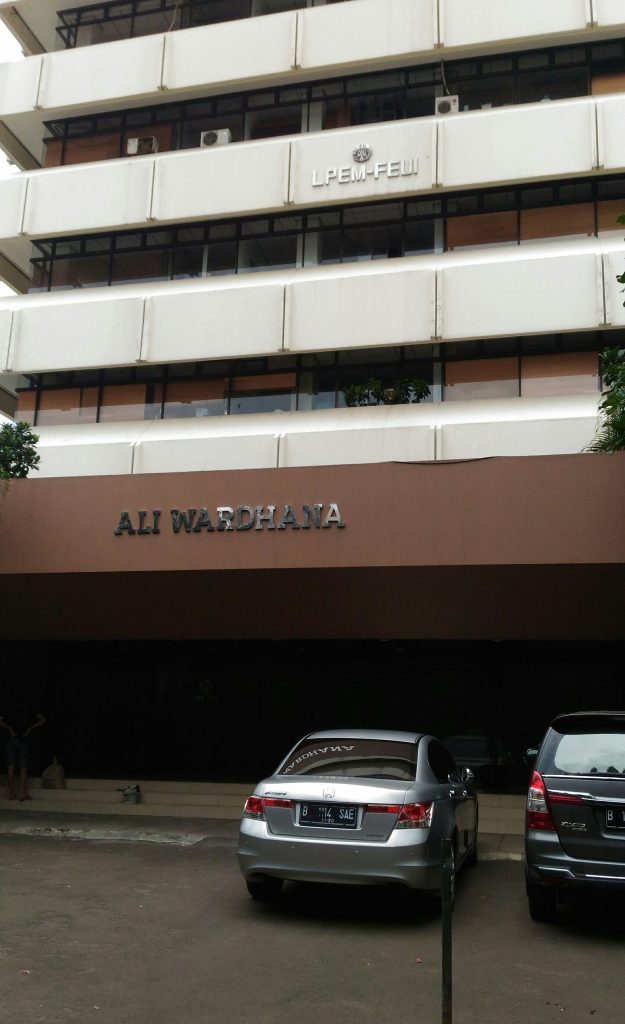The establishment of a research center within the academic community at the Faculty of Economics, University of Indonesia was spearheaded by Prof. Dr. Soemitro Djojohadikusomo. In 1953, Prof. Dr. Soemitro Djojohadikusumo, who served as the Dean of Faculty of Economy of University of Indonesia (now the name become Faculty of Economics and Business), established two research centers: Business Administration Seminar and Social Research Centre, to support research done by doctoral candidates in the school. The objective of establishing both research centers was to support the research activities by doctoral candidates. In November 1953, the Social Research Centre became the Institute for Economic and Social Research (LPEM-FEUI, or “LPEM”). In 1956, the Business Administration Seminar was merged into LPEM.
LPEM is currently undertaking research, consulting, and training to solve development problems for the benefit of Indonesian society. These activities are based on robust research culture that includes applying theories in analyzing, understanding and providing policy recommendations. Supported by research staff holding advanced degrees from the best universities, both domestic and abroad, LPEM is always ready to help provide solutions to Indonesia’s problems.
Research and consultation are the main activities of the Institute. Most of them are conducted in cooperation with other parties. Our partners are government or private institutions with domestic or foreign affiliations. In the last 60 years, LPEM has completed more than 1.500 research projects covering a wide range of areas, such as institutional problems, regional economics, international economic relations, international trade, finance and banking, fiscal and monetary economics, agriculture, industry, tourism, rural development, demography, labor, poverty, income distribution, small-scale enterprises, and cooperatives.
LPEM also conducts seminars, both regular and non-regular seminars, at the national and international levels. Examples include past annual seminar sponsored by United States Agency for International Development (USAID), the recent yearly seminar series on competitiveness with Japan Bank for International Cooperation (JBIC), the annual academic seminar in cooperation with the Australian National University (ANU), and the Sadli Lecture (seminar) series. Our research projects are mostly policy-oriented research that provides crucial inputs to policymakers, ranging from national, regional, and district-level development planning to more operational policy formulation in various aspects and development sectors.
LPEM has a long history of working with the private sector. In the 1990s, the cooperation with the private sector had increased as firms face the need to be more efficient in the global era. Since the outbreak of the economic crisis in 1997, the need to restructure corporations in Indonesia has become even more critical. In this area, LPEM is also active in advocacy and consulting activities. Anticipating further economic development and increasing demand for high research quality, LPEM established two research divisions: Economic and Policy Research Division; and Infrastructure and Regional Development Research Division.
The Education and Training Division was established to provide services to increase human resources quality (mainly of government officials). The division has conducted various activities since 1978 and also a series of national and international seminars. Participants of the education and training programs come from multiple regions with government or private sector affiliations. The education activities are divided into “regular” training conducted every year and “non-regular” training held as requested by clients. Regular training currently consists of regulatory impact assessment training, introductory econometrics training, and STATA data management training. Non-regular training is divided by training related to planning (functional planner training, regional development planning training, etc.), public finance (regional finance training, regional finance exercises training, etc.), public policy (public policy basic analysis training, public policy advanced analysis training, etc.), economics and social (macroeconomics analysis training, international trade training, social mapping training, conflict management training, etc.) and methodology (advanced and basic statistics training, advanced and basic econometrics training, etc.). The most frequent courses/piece of training includes National Planning Program, Development Planning Techniques, and Support Function Planning. These activities are generally conducted in 1-6 months. There is also shorter training (1-2 weeks) with specific topics such as Participation Planning, Potential of Regional Economic, Public Policy Analysis, Project Monitoring and Evaluation, Public Development, and Regional Finance and Budgeting.


